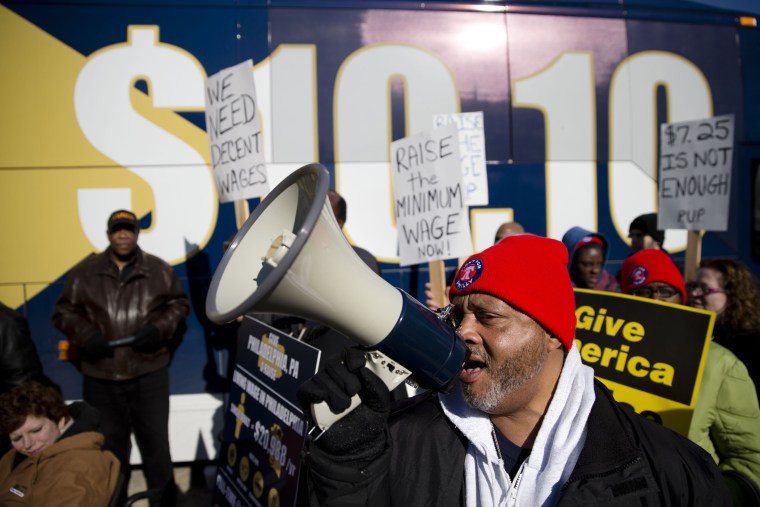The Democratic push to raise the minimum wage was put on hold in Congress when lawmakers took a two-week break, but the recess is over and so is the delay on this major 2014 policy fight.
At the state level, Connecticut, Maryland, and Minnesota have each acted on their own to raise the state minimum wages, and policymakers in Hawaii have now reached an agreement to raise their state's minimum to $10.10 over the next four years.
On Capitol Hill, meanwhile, Senate Majority Leader Harry Reid (D-Nev.) yesterday moved to bring the federal measure on the minimum wage to the floor this week.
Reid filed cloture on the motion to proceed to S. 2223, a bill from Sen. Tom Harkin (D-Iowa) that would increase the minimum wage from $7.25 to $10.10 an hour. The vote could come as early as Wednesday. The vote will be a major test of unity for Senate Democrats, who have made the wage hike central to their populist agenda for the midterm elections.
This shouldn't be too tough for Democrats -- it's an election year and roughly three-fourths of the country supports a minimum-wage increase. Keeping Dems united seems like a straightforward task.
But in practice, Sen. Mark Pryor (D-Ark.) has already announced his opposition, while some other Senate Democrats have quietly expressed support for Sen. Susan Collins' (R-Maine) alternative proposal for a much smaller increase.
The bill will need 60 votes anyway to overcome a Republican filibuster, which means if every non-Pryor Democrat backs the bill, supporters would still need six GOP votes to end the obstructionism, pass the increase, and send the bill to the House. To put it mildly, it's an uphill climb.
Which makes the Democratic struggle for unity that much more difficult to understand.
Look, it's pretty obvious how this is going to play out. Democrats have made a minimum-wage increase a top legislative priority for this Congress, but Republican opposition is simply unyielding. Even if six GOP votes were to somehow materialize in the Senate, the odds of the Republican-led House even bringing this to the floor for consideration are roughly zero.
So why go through the motions? Because Dems, not unreasonably, see this as a fight worth having, even if the outcome is predetermined. This election year, they figure, it's worth getting lawmakers on the record, either endorsing or rejecting a popular economic proposal that would give millions of Americans a raise.
Given this, Senate Democrats don't have much of an incentive to balk at their own party's priority. Indeed, they have nothing to be afraid of -- the bill won't become law, at least not this year, and it's not as if the right is going to run attack ads condemning Dems for supporting an idea that enjoys broad national support.
If the goal is to pressure Republicans and make the GOP look bad for opposing a wildly popular idea, it seems Democrats would be wise to stick together on a vote that has limited practical consequences anyway.
